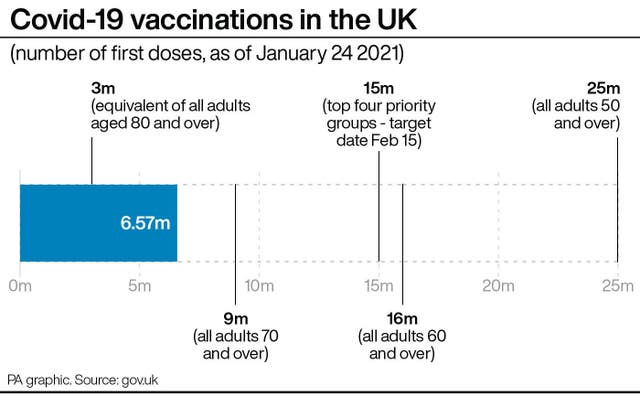By Ben Kerrigan-
Health experts are monitoring mutant coronavirus variants to find out which ones could cause vaccine evasion, a senior Government adviser has said.
Dr Susan Hopkins, chief medical adviser to Public Health England and NHS Test and Trace, said that scientists were examining which of the variants were common and which could cause vaccination evasion, meaning some of the variants may not be responsive to vaccination.
Scientists are concerned about the mutations discovered in the UK and South Africa because they are believed to be capable of altering key functions of the virus.
Dr Hopkins said the UK was leading such discussions with its vaccine task force, adding: ‘We are coming together with scientists to build what we think is the likely mutations that will cause changes in our immunity and our immune response to vaccines. ‘We are already looking at how fast a new vaccine could be built and rolled out in this country.’
Dr Jenny Harries, deputy chief medical officer for England, said that virus mutations are “quite normal” and stressed that it is unlikely that vaccines would not have “some degree of effectiveness, even for new virus mutations” identified.
And Dr Hopkins said that treatments such as dexamethasone should still work “perfectly”.
It’s quite unlikely in clinical terms that vaccines would not have some degree of effectiveness, even for new virus mutations that we identify
Dr Hopkins told a Downing Street press conference: “We are ensuring that we look at all of the new variants that are emerging globally, we’re understanding which of the mutations in these variants are common and that are likely to be the ones that will come together to cause vaccine evasion.
“We will then use our global scientific networks to try and work with WHO (World Health Organisation) and other global partners to decide what the new vaccine should look like.
“However, in the UK we’re already leading these discussions with our Vaccine Taskforce, and we are coming together with scientists to build what we think are the likely mutations that will cause changes in our immunity and our immune response to vaccines, and we are already looking at how fast a new vaccine could be built and rolled out in this country.”
But Dr Harries added: “It’s important that we realise it’s quite normal for viruses to mutate and we will have numerous mutations as we go forward, not all of them, in fact the vast majority of them, will not be of concern.
“Importantly, even though the work is ongoing to ensure that we understand exactly how the vaccines work with these different mutations we’ve identified, it’s quite unlikely in clinical terms that vaccines would not have some degree of effectiveness, even for new virus mutations that we identify.”
Meanwhile, Dr Hopkins added that drugs like dexamethasone should still be effective in treating patients infected with the new variant.
Meanwhile, Dr Hopkins added that drugs like dexamethasone should still be effective in treating patients infected with the new variant.

“We would expect dexamethasone to work perfectly because this is about reducing your own immune response and calming that down so that your body can get over this virus with its own immune response,” she said.
A paper from the New And Emerging Respiratory Virus Threats Advisory Group (Nervtag), published on Friday, said there was a “realistic possibility” that the variant is associated with an increased risk of death.
Data suggests that for a thousand men in their 60s who became infected with the old variant, roughly 10 would be expected to die – whereas with the new variant it might be 13 or 14, with similar increases in mortality rates across the age range.
John Edmunds, professor in the Centre for the Mathematical Modelling of Infectious Diseases, London School of Hygiene and Tropical Medicine, and member of Nervtag, said: “If the case fatality ratio stayed the same, an increase in transmissibility is worse than a corresponding increase in case fatality because you have an expanding epidemic, and so more and more cases.
“Unfortunately, it looks as if this virus might be both – certainly increased transmissibility compared with the previous strains that we were dealing with, and it looks as if unfortunately it may also increase fatality as well, so it’s really a serious turn for the worse unfortunately.”
The experts also said that despite the data suggesting the mutant variant may be more deadly, there is no evidence to indicate existing treatments, like dexamethasone, will not be effective against it.
Peter Horby, professor of emerging infectious diseases, University of Oxford, and chairman of Nervtag, said: “The core principles of control remain exactly the same for this virus as the old variants.
“There’s no evidence that this new virus is evading any of the treatments that have been found to work or any of the vaccines.
“It just highlights the importance of continuing to drive down the numbers of infections occurring.”
Deadly And Transmissible
It comes after scientists suggested that the new coronavirus strain first found
Dr Jenny Harries, deputy chief medical officer for England, said that virus mutations are “quite normal” and stressed that it is unlikely that vaccines would not have “some degree of effectiveness, even for new virus mutations” identified.
And Dr Hopkins said that treatments such as dexamethasone should still work “perfectly”.
It’s quite unlikely in clinical terms that vaccines would not have some degree of effectiveness, even for new virus mutations that we identify
New Variants
Dr Hopkins told a Downing Street press conference: “We are ensuring that we look at all of the new variants that are emerging globally, we’re understanding which of the mutations in these variants are common and that are likely to be the ones that will come together to cause vaccine evasion.
“We will then use our global scientific networks to try and work with WHO (World Health Organisation) and other global partners to decide what the new vaccine should look like.
“However, in the UK we’re already leading these discussions with our Vaccine Taskforce, and we are coming together with scientists to build what we think are the likely mutations that will cause changes in our immunity and our immune response to vaccines, and we are already looking at how fast a new vaccine could be built and rolled out in this country.”
But Dr Harries added: “It’s important that we realise it’s quite normal for viruses to mutate and we will have numerous mutations as we go forward, not all of them, in fact the vast majority of them, will not be of concern.
“Importantly, even though the work is ongoing to ensure that we understand exactly how the vaccines work with these different mutations we’ve identified, it’s quite unlikely in clinical terms that vaccines would not have some degree of effectiveness, even for new virus mutations that we identify.”
Meanwhile, Dr Hopkins added that drugs like dexamethasone should still be effective in treating patients infected with the new variant.
“We would expect dexamethasone to work perfectly because this is about reducing your own immune response and calming that down so that your body can get over this virus with its own immune response,” she said.
A paper from the New And Emerging Respiratory Virus Threats Advisory Group (Nervtag), published on Friday, said there was a “realistic possibility” that the variant is associated with an increased risk of death.
Data suggests that for a thousand men in their 60s who became infected with the old variant, roughly 10 would be expected to die – whereas with the new variant it might be 13 or 14, with similar increases in mortality rates across the age range
John Edmunds, professor in the Centre for the Mathematical Modelling of Infectious Diseases, London School of Hygiene and Tropical Medicine, and member of Nervtag, said: “If the case fatality ratio stayed the same, an increase in transmissibility is worse than a corresponding increase in case fatality because you have an expanding epidemic, and so more and more cases.
“Unfortunately, it looks as if this virus might be both – certainly increased transmissibility compared with the previous strains that we were dealing with, and it looks as if unfortunately it may also increase fatality as well, so it’s really a serious turn for the worse unfortunately.”
The experts also said that despite the data suggesting the mutant variant may be more deadly, there is no evidence to indicate existing treatments, like dexamethasone, will not be effective against it.
Peter Horby, professor of emerging infectious diseases, University of Oxford, and chairman of Nervtag, said: “The core principles of control remain exactly the same for this virus as the old variants.
“There’s no evidence that this new virus is evading any of the treatments that have been found to work or any of the vaccines.
“It just highlights the importance of continuing to drive down the numbers of infections occurring.”




